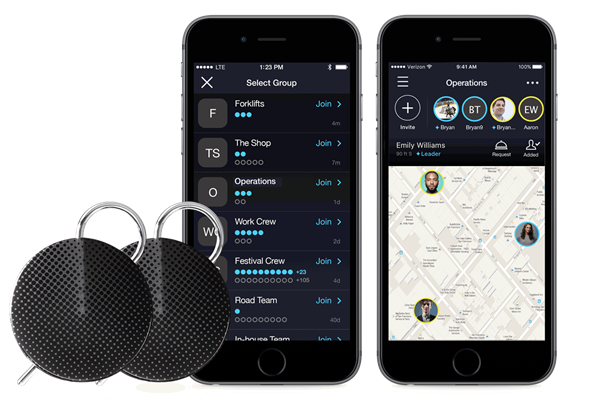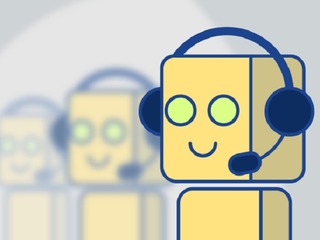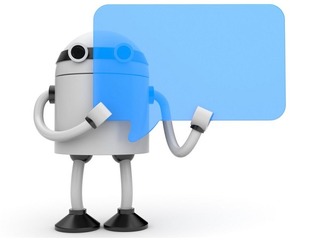Smart infant monitoring company Owlet partners with Wheel
Wheel clinicians will be able to prescribe Owlet's BabySat, which monitors oxygen and heart rate
Read more...
For many B2C companies, bots are becoming so common that it will likely soon seem strange for any business not to have an easy to access customer service bot on platforms like Facebook Messenger.
While consumers seems to have gained the most from bot technology, the enterprise hasn't had the same type of advancements, despite the glaring need for team members and field workers to utilize these same voice services. Orion Labs wants to be the solution to that problem by providing a voice communication platform for teams in business, enterprise, and government organizations.
On Wednesday the company announced that it has raised an $18.25 million financing round led by Allen & Company LLC with participation from new investors including Argentum, The Thermo Companies, John Kelly, Joshua Schachter, and others. Also participating were existing investors Avalon Ventures, Motorola Solutions, Fuel Capital, David Recordon, James Lindenbaum, and others.
This brings the company's total funding to just over $30 million.
In conjunction with the new funding, it was also revealed that Richard Fields of Allen & Company has joined the Board of Directors at Orion Labs, and Walter Barandiaran, Co-founder & Managing Partner of Argentum, has joined as an Observer.
Real-time voice communication in the workplace
Founded in 2014 by Jesse Robbins, who previously built and ran Amazon's Web platform, and Greg Albrecht, former cloud infrastructure lead at Splunk, Orion is a platform for real time communication in the workplace, with a specific focus on environments, "where people need to be heads up, and where they need to be eyes free," Robbins told me in an interview. That includes industries such as construction, hotel management, event management, medical professionals, transportation, retail and food.
The inspiration for the company came from the experience that both Robbins and Albrecht had in their own careers with radios and push-to-talk communications; the former is a firefighter and EMT, while the latter is an EMT and emergency manager.
"We occupy this really interesting space where we understand a very, very hard problem that tens of millions of Americans face in their jobs every day, which is: how do you talk to each other, how do you collaborate, how do you coordinate?" said Robbins. "The problem we set out to solve was really to make it much easier for people in the field, who need to communicate, to be able to do without losing focus on the job in front of them."
Orion's solutions include the Onyx wearable communication device, which allows users to talk privately or with teams, as well as Orion Pro, a hosted subscription service that allows organizations to onboard new users and manage permissions.
In a physical retail environment, for example, which is under threat from the Amazons and Jets of the world, there has to be a higher focus on customer service to get people to come in. With Orion, a retail associate can get information about what's in stock with their voice, without having to temporarily turn away from the customer.
In a critical communication environment, like in healthcare, where someone might be dealing with a patient, the doctor or nurse can use their voice to look up hospital status, or get the patient's record, while not neglecting the person in front of them.
The company doesn't disclose specific numbers about how many customers it has, but Robbins did tell me that it has thousands of people currently using it, and that Orion recently announced a partnership with Federal Resources to start onboarding government customers.
Translation services and beyond
Bot technology has proven to be quickly embraced by the workers in these industries.
"When we started showing this to customers in the field, they immediately began asking about more advanced voice capabilities and bots, even in environments where you wouldn't necessarily expect them to be tech early adopters," Robbins told me. One of the most common requests was for real-time language translation, with the number one request being an English/Spanish translation.
In response, the company also announced on Wednesday that it is allowing all of its customers to access a preview of Translator, Orion’s new real-time voice translation bot.
Translation services are just the beginning of what Orion wants to do with its platform.
"Providing real time, heads up translation is just a first step, but, boy, it's a big one," Robbins said.
"Going forward, languages are important but also specialty systems. For instance, medical oriented data and training, legal, locational, etc, where we have specific services that we integrate with. One of the unique parts about what we built is that this is a very flexible system. So, for a retail environment, we have to connect our bots and services, not just with the language components, but also so they can answer questions, like, 'Is this item in stock?' or, 'What's the next customer that I need to meet with?' The power of what we’ve done is shown by the fact that we can do the multi language translation, but that's a preview so that people get feel for what we’re doing now as we start to roll out additional services."
In addition to spending this new funding to build out the platform, the company will also expand its team, including its sales team, which currently consists of only two people, and its engineering team, growing from 50 employees to 70 over the next six months.
The present and future of the chatbot space
Starting in 2016, the idea of bots when mainstream, and how many of the major tech companies, including Facebook, Google, Amazon and Microsoft, have made them an integral part of their strategies going forward. That means that there's not only widespread awareness in every industry now, but there are now also platforms for Orion to build upon.
"A year and a half ago, when we would have these first conversations with customers, this is before widespread awareness awareness of things like Alexa, our customers viewed us as kind of a super powered walkie-talkie, or a Star Trek communicator badge. In the last year, what's changed it there is no customer environment that we walk into where they are not already thinking about how they're going to use voice driven, real-time, chatbot oriented services," Robbins said.
"What we're finding that what's changed is that customers have big ideas, they have real big problems that they need to solve. And they have an expectation that the most complicated enterprise workflows should be as easy to reinvent as turning a light on and off using Alexa and Cortana."
Ultimately, Robbins sees a world where voice interfaces become the new apps. Where voice becomes ubiquitous, and where it reinvents industries, much the same way the smartphone did when it was released 10 years ago. His plan is for Orion to be at the center of that shift.
"What motivates us, and what we are really building the company to do, is to build core infrastructure for people to get new and better work done. Something that is a part of most people’s lives, and where they're running on a constellation of Orion devices and services. That might be the way that you're talking to your car or your refrigerator. We're really giving people a type of superpower in many different industries that have not been touched by all the technological innovation that's happened in knowledge work environment and elsewhere," he said.
"What we're hoping is that we're providing the platform for people and machines to talk and collaborate in real time and that is a foundational technology that just assumes to be part of your every day life. Inside of our company, what we're really building for is to be a technology that powers businesses and makes people's lives better. We think that's something that we have a unique position to do, specifically because we understand this new environment. We come from unique backgrounds that combine both real time, large scale Internet systems, and hardworking, field deployed folks that have jobs could be made better with technology. That's what we hope we’ll be doing in five years."
Wheel clinicians will be able to prescribe Owlet's BabySat, which monitors oxygen and heart rate
Read more...Amish Jani, Founder and Partner at FirstMark, joined the company's Board of Directors
Read more...The report outlined four areas as a guide to help startups to sell into these systems
Read more...


